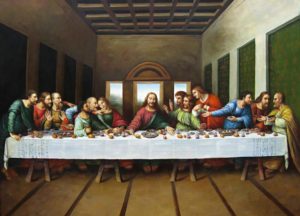The Bible tells us that Jesus sang with his disciples on the night before his crucifixion (Matthew 26:30; Mark 14:26). What exactly did they sing? They sang the Hallel. The Hallel is a section of the Old Testament found in Psalm 113-118. This portion of scripture is traditionally sung throughout the Passover meal. This is the same meal Jesus partook of with his disciples on his final night in the upper room just before they went to the Mount of Olives to pray (Mark 14:12-16). Why did they sing? What makes these Psalms so important is that they are historical and prophetic. Psalm 113-118 rejoices in God who has provided salvation for his people and continues to look toward the Lord for a future salvation. Jesus’s disciples did not understand how Christ was going to fulfill the prophetic statements found in this portion of the Bible. However, today we can look at this same section of scripture and stand in awe of a God who has orchestrated such a beautiful plan of salvation and redemption. If you were to read the Hallel, this is what you will find:
- Psalm 113 is an introductory psalm of praise to our glorious God.
- Psalm 114 reflects upon the salvation God provided for his people from slavery in Egypt to freedom in the Promise Land. This serves as picture of the way God will ultimately rescue his people from the bondage of sin to freedom in Him.
- Psalm 115-118 are Messianic. This means they are psalms that prophetically look forward to the eternal salvation that will be provided for his people.
- Psalm 115 tells us to keep looking for salvation in God. The last verse of this Psalm reminds us that God’s people will praise Him for eternity.
- Psalm 116 is powerful when you picture Jesus partaking of communion at the Last supper. Verse 13 talks of “lifting up the cup” of salvation. Jesus lifted this cup in the upper room with his disciples to remind us of his body that would be broken as the sacrifice for sin (Luke 22:19). When Jesus was in the garden he prayed “let this cup pass from me, but nevertheless not my will but yours be done” (Matthew 26:39). During a traditional Passover dinner, every participant had to “drink deep” from the communion cup before you could “let the cup pass”. They would drink from the communion cup until it was empty. The last person who drank from the communion cup had to “drink deep” and swallow the bitter herbs that remained at the bottom of the cup. The herbs represent sin. Before Jesus could “let his cup pass” he had to “drink deep”. Communion is the symbol of Jesus sacrifice. Before Jesus’s suffering ended, he had to swallow the bitter herbs of sin. He had to drink deep before the cup could pass. While in the Garden, Jesus said to the father, Father “let this cup pass from me”. Jesus is asking the Father to give him the strength to swallow the bitter sinful herbs. Then Jesus said, “not my will but yours be done”. Jesus was obedient to the Father to the point of death (Phil 2:8). Take some Time and read Psalm 116:12-19 and just imagine Jesus fulfilling these words on the night of his crucifixion. Picture him singing these words to the disciples in the upper room.
- Psalm 117 is even more profound after you understand psalm 116. In psalm 117 you see God calling all of the nations to salvation in Jesus. This is the shortest of the Psalms. If you were to look at it you would be astounded just how short it is. This is a powerful psalm built on a promise found throughout scripture. Beginning in Genesis 12 God calls a man named Abraham and he tells Abraham that through him a seed will come that will bless all nations (See Genesis 22:18).
- Psalm 118 is a perfect concluding psalm. We know from the gospels that the crowds in Jerusalem sang the Hallel during Passover because the crowds sang Psalm 118 over Jesus when he entered Jerusalem on the back of a donkey. By riding on the back of a donkey, Jesus is following a custom for rulers. It was historically common for Israel’s leaders to travel on a donkey throughout their land, especially in times of peace. By traveling on a donkey, Jesus is presenting himself as the Prince of Peace (Matthew 21:1-11; Zechariah 9:9; Isaiah 62:11; 9:6). As Jesus enters Jerusalem as King, the crowd recognizes the symbolism and they declare the Hallel. “Hosanna to the Son of David! Blessed is he who comes in the name of the Lord! Hosanna in the highest heaven!”(Psalm 118:25-26). It is in Psalm 118:21 that we learn Jesus is our salvation. However, Psalm 118:22 says Jesus will be “the stone which the builders rejected”. Ironically, the same Psalm used to praise Jesus as the Saving King (Ps. 118:21,25,26) also declares the people will reject Jesus (Ps 118:22).
I am so thankful the gospel writers wanted us to be aware of how Jesus and the Disciples sang the Hallel at the Last supper and how the people Sang the Hallel at Jesus’s triumphal entry (Mark 14:26; Matthew 21:1-11). The content of the Hallel is a beautiful explanation and prophetic fulfillment of God’s plan of redemption for his people throughout history. Take some time to familiarize yourself with this section of scripture.
